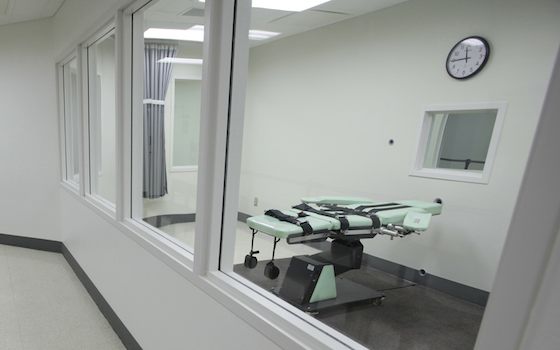- MENU
- HOME
- SEARCH
- WORLD
- MAIN
- AFRICA
- ASIA
- BALKANS
- EUROPE
- LATIN AMERICA
- MIDDLE EAST
- United Kingdom
- United States
- Argentina
- Australia
- Austria
- Benelux
- Brazil
- Canada
- China
- France
- Germany
- Greece
- Hungary
- India
- Indonesia
- Ireland
- Israel
- Italy
- Japan
- Korea
- Mexico
- New Zealand
- Pakistan
- Philippines
- Poland
- Russia
- South Africa
- Spain
- Taiwan
- Turkey
- USA
- BUSINESS
- WEALTH
- STOCKS
- TECH
- HEALTH
- LIFESTYLE
- ENTERTAINMENT
- SPORTS
- RSS
- iHaveNet.com: United States

by Mary Sanchez
As fervently as some may support the death penalty by lethal injection, when the process becomes the least bit messy, most of us would prefer to hide.
Prison officials reacted quickly as Lockett's execution turned from an antiseptic medical procedure into a debacle. They hastily pulled the execution chamber's curtain shut, lest the witnesses present be forced to watch the condemned actually fight to hang on to life.
That's not how we like this show to go. In America, we like the capital punishment to be more like a monitored death in hospice care, a permanent sedative ushering a long good night.
That dishonesty is the basis for how we've reached a legal and moral conundrum. Increasingly, states are taking steps to keep the drugs they are using a secret, along with the identities of the scantly regulated compounding pharmacies where they buy the drugs and even how the payments are being made. This makes it impossible to determine whether or not the new, ever evolving lethal drug cocktails administered meet the constitutional standard of sparing the condemned from "cruel or unusual" punishment.
The American way of execution is in legal crisis -- that much is obvious regardless of whether one is for or against the death penalty. States can't defend the use of drugs they won't name, nor can citizens demand that justice be done to those on death row.
Naturally, there is a sadist's view of what happened to Lockett. The chorus began shortly after Lockett he was declared dead of a heart attack, 43 minutes after his ordeal began. "It's an execution, not a tea party," remarked one online commentator.
In the minds of many, cruel and unusual was just what Locket deserved. In 1999, he forced 19-year-old
Nobody disputes Lockett's guilt or the horror of his crime.
But what was done to Lockett was an unjustifiably gruesome act of homicide. And
It began as a Republican state legislator tried to save face and appear harsh enough, conservative enough, among his peers. How familiar that sounds as a recipe for bad legislation.
Rep.
"I knew it was wrong, and I should have voted against it. But I didn't," Wiseman told Mother Jones in 2005. (He died in a plane crash in 2007.)
To assuage his guilt, Wiseman took another step.
He wrote the legislation that brought lethal injection to the state of
Today, more than 30 states have the death penalty and almost all of them use lethal injection. The problem is, key chemicals used to make the deadly drugs are no longer available and stocks are dwindling. Sodium thiopental, for example, is no longer made in
The day may not be far off when states must abandon the fiction of medically sterile execution and go back to the messier, less "humane" methods of old. When that happens, it's a good bet public support of the death penalty will erode quickly (it currently stands at 55 percent). The electric chair sometimes sets inmates on fire. Hanging can decapitate. The firing squad is too violent for most.
Try as we might, we will not find a humane way to commit an inherently inhumane act -- putting a person to death -- and as long as we do, we put our nation under a moral cloud.
Available at Amazon.com:
The Divide: American Injustice in the Age of the Wealth Gap
The New Jim Crow: Mass Incarceration in the Age of Colorblindness
The Divide: American Injustice in the Age of the Wealth Gap
WORLD | AFRICA | ASIA | EUROPE | LATIN AMERICA | MIDDLE EAST | UNITED STATES | ECONOMICS | EDUCATION | ENVIRONMENT | FOREIGN POLICY | POLITICS
Article: Copyright ©, Tribune Content Agency
"Botched Execution Should Be Death Knell of Capital Punishment "